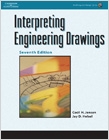Description: Comprehensive, state-of-the-art training is the cornerstone of this popular guide that shows users how to create professional-quality engineering drawings that can be interpreted with precision in today's technology-based industries. Clearly the most flexible, user-friendly book of its kind on the market, the seventh edition offers unsurpassed coverage of the theory and practical applications individuals need to communicate technical concepts in an international marketplace. All material is developed around the latest ASME drawing standards, helping readers keep pace with the dynamic changes in the field of engineering graphics. Product Benefits: - Extensive sketching techniques develop the ability to understand and communicate technical information, an increasingly important skill as CAD continues to rapidly replace board drafting
- More assignments and Internet resource listings designed to broaden and reinforce basic concepts and gain useful information have been added
- Carefully developed illustrations, reinforced by the use of a second color, provide a clear understanding of material covered
- A bank of test questions and answers has been provided for each unit of the book for use in evaluating reader progress
- The complete Instructor's Manual is now packaged on CD for faster and more convenient access to review tests and solutions, assignment solutions, test generator, PowerPoint presentations, and other useful teaching materials
Table of Contents: Unit 1
Bases for Interpreting Engineering Drawings
Engineering Drawings
Line Styles and Lettering
Sketching
Information Shown on Assignment Drawings
Unit 2
Lines Used to Describe the Shape of a Part
Title Blocks and Title Strips
Drawing to Scale
Unit 3
Circular Features
Center Lines
Sketching Circles and Arcs
Unit 4
Working Drawings
Arrangement of Views
Third-Angle Projection
Sketching Views in Third-Angle Projection
Unit 5
Dimensioning
Dimensioning Straight-Line Features
Unit 6
Inclined Surfaces
Measurement of Angles
Symmetrical Outlines
Machine Slots
Unit 7
Pictorial Sketching
Isometric Sketching
Oblique Sketching
Unit 8
Machining Symbols
Not-To-Scale Dimensions
Drawing Revisions
Break Lines
Unit 9
Sectional Views
Types of Sections
Countersinks, Counterbores, and Spotfaces
Intersection of Unfinished Surfaces
Unit 10
Chamfers
Undercuts
Tapers
Knurls
Unit 11
One- and Two-View Drawings
Multiple-Detail Drawings
Functional Drafting
Unit 12
Surface Texture
Surface Texture Symbol
Surface Texture Ratings
Control Requirements
Unit 13
Tolerances and Allowances
Definitions
Tolerancing Methods
Unit 14
Inch Fits
Description of Fits
Standard Inch Fits
Unit 15 Metric Fits
Unit 16
Threaded Fasteners
Threaded Assemblies
Threaded Holes
Inch Threads
Right- and Left-Handed Threads
Metric Threads
Unit 17 Revolved and Removed Sections
Unit 18
Keys
Set Screws
Flats
Bosses and Pads
Dimension Origin Symbol
Rectangular Coordinate Dimensioning Without Dimension Lines
Rectangular Coordinate Dimensioning in Tabular Form
Unit 19 Oblique Surfaces
Unit 20 Primary Auxiliary Views
Unit 21 Secondary Auxiliary Views
Unit 22
Development Drawings
Joints, Seams, and Edges
Sheet Metal Sizes
Stampings
Unit 23 Arrangement of Views
Unit 24
Piping
Piping Drawings
Pipe Drawing Symbols
Unit 25 Bearings
Unit 26
Manufacturing Materials
Cast Iron
Steel
Plastics
Rubber
Unit 27
Casting Processes
Casting Design
Cored Castings
Machining Lugs
Surface Coatings
Unit 28
Chain Dimensioning
Base Line (Datum) Dimensioning
Unit 29
Alignment of Parts and Holes
Partial Views
Naming of Views for Spark Adjuster
Drill Sizes
Unit 30
Broken-Out and Partial Sections
Webs in Section
Ribs in Section
Spokes in Section
Unit 31
Pin Fasteners
Sections Through Shafts, Pins, and Keys
Arrangement of Views of Drawing A-85M
Unit 32
Drawings for Numerical Control
Dimensioning for Numerical Control
Dimen... |

